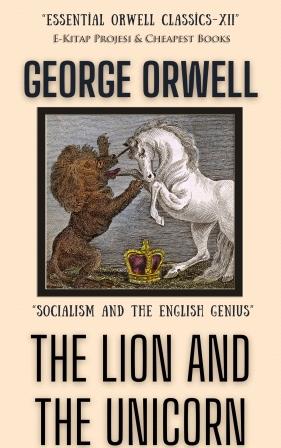
The Lion and the Unicorn
The Lion and the Unicorn: Socialism and the English Genius was published in February 1941, well into the Second World War, after Dunkirk and the Battle of Britain.
More Search Results...

The Lion and the Unicorn: Socialism and the English Genius was published in February 1941, well into the Second World War, after Dunkirk and the Battle of Britain.
PREFACE
- "As I write, highly civilized human beings are flying overhead, trying to kill me."
- "Literature, especially poetry, and lyric poetry most of all, is a kind of family joke, with little or no value outside its own language-group."
― George Orwell, The Lion and the Unicorn: Socialism and the English Genius
The Lion and the Unicorn: Socialism and the English Genius was published in February 1941, well into the Second World War, after Dunkirk and the Battle of Britain. It is a long essay, divided into three parts.
1. England Your England (35 pages)
2. Shopkeepers at War (19 pages)
3. The English Revolution (9 pages)
The three essays 1. describe the essence of Englishness and records changes in English society over the previous thirty years or so 2. make the case for a socialist system in England 3. argue for an English democratic socialism, sharply distinct from the totalitarian communism of Stalin.
Now, at this distance of 76 years, the political content seems to me almost completely useless. After the war, the socialist policies carried out by Attlee's government, thirty years of 'Butskellism' and Britain's steady industrial decline into the 1970s which was brutally arrested by Mrs Thatcher's radical economic and social policies of the 1980s, followed by Tony Blair's attempt to create a non-socialist Labour Party in the 1990s, and all the time the enormous social transformations wrought by ever-changing technology – the political, social, economic, technological and cultural character of England has been transformed out of all recognition.
That said, this book-length essay is still worth reading as a fascinating social history of its times and for its warm evocation of the elements of the English character, some of which linger on, some of which have disappeared.